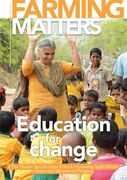When the focus is on group learning and innovation, and building on what participants know and wish to learn and apply, field-based education can be relatively low-cost and yield rapid improvements in production. Peter Ton argues for farming-oriented education, presenting the positive results seen with Farmer Field Schools (FFS).

In industrialised countries only a small percentage of the primary school students will make a future living in agriculture. Urbanisation is also a strong trend in developing countries. Still, farming is and will remain a reality and a suitable mode of living for hundreds of millions around the world. Many young people will follow in their parents’ footsteps, becoming growers or herders and entrepreneurs alike. How can we prepare these pupils best for their future agricultural careers? Is the uniform national primary education system sufficiently geared to their realities? And what about the education rights of middle-aged women and men who missed out on primary education in the past but are able and eager to learn, and in their best years to exploit their land and resources in a sustainable way?
Agriculture is not foot-loose. Production depends on the context and available resources, including the quality of the land, the local climate, and the quality of the services provided by third parties. But most of all, it depends on the knowledge and skills of the men and women working on the farms. The best way to increase agricultural productivity is to support the continuous development of their knowledge and skills on the spot: learning on the field and learning from the field.
Field-based education can be relatively low-cost and yield rapid improvements in production when the focus is on group learning and innovation, and building on what participants know and wish to learn and apply. Farmer Field Schools (FFS) have shown such positive results, and are an exemplary model to follow. Tried in many countries and in different contexts, FFS support groups of farmers in a real-life setting. FFS enhance the observation, analysis and learning skills of participants while focusing on the real challenges they face.
Governments, communities and donors are called upon to invest in today’s and tomorrow’s farmers with Farmer Field School-based approaches, to help increase production, to reduce poverty and to strengthen farming communities. There is no better way to strengthen agriculture and the rural areas than by investing in the human capacity that sustains it.
Peter Ton
Peter Ton works as a consultant on sustainable agriculture, value chains and corporate social responsibility. He has been involved in evaluation of FFS programs in West, Central and East Africa, and in the 2012 FAO Global Review of FFS experiences.
E-mail: peterton@xs4all.nl

